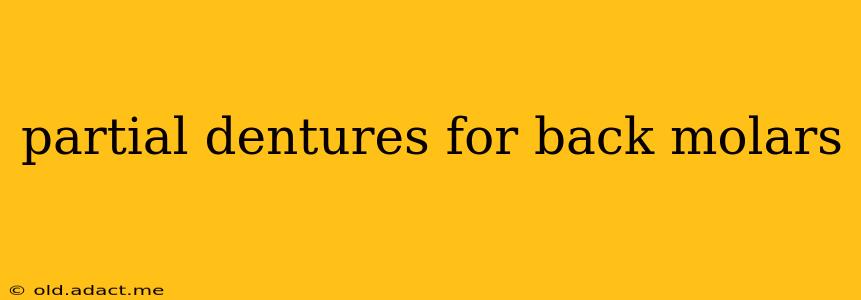Losing back molars can significantly impact your ability to chew, speak, and even maintain the overall structure of your face. While implants are often the preferred solution for missing teeth, partial dentures offer a viable and often more affordable alternative, especially for replacing back molars. This comprehensive guide will explore the nuances of partial dentures specifically designed for back molar replacement.
What are Partial Dentures?
Partial dentures are removable prosthetic devices designed to replace one or more missing teeth. Unlike full dentures, which replace an entire arch of teeth, partial dentures fill in gaps within existing natural teeth. They are typically crafted from a combination of acrylic resin (for the pink gum-colored base) and metal frameworks for strength and support. The artificial teeth are attached to this framework, creating a natural-looking and functional replacement.
Are Partial Dentures Suitable for Replacing Back Molars?
Absolutely! Partial dentures are a highly effective solution for replacing back molars. The design can be customized to precisely fit the remaining teeth and the shape of your jaw, providing excellent support and stability. The posterior (back) area of the mouth often requires robust support, and a well-designed partial denture can effectively provide this.
How are Partial Dentures for Back Molars Made?
The process generally involves several steps:
- Initial Consultation and Examination: Your dentist will thoroughly examine your mouth, assessing the remaining teeth, jawbone structure, and the overall health of your gums. X-rays may be taken.
- Impressions and Models: Precise impressions (molds) of your teeth and gums are taken. These are then used to create accurate models of your mouth.
- Framework Design and Construction: A metal framework is designed and crafted to fit snugly against your remaining teeth. This framework acts as the foundation for the artificial teeth.
- Tooth Placement and Arrangement: Artificial teeth, typically made of porcelain or acrylic, are carefully placed and arranged on the framework to match your natural bite and appearance.
- Fitting and Adjustments: The partial denture is fitted, and any necessary adjustments are made to ensure a comfortable and proper fit.
What are the Advantages of Partial Dentures for Back Molars?
- Cost-Effectiveness: Partial dentures are generally less expensive than dental implants, making them a more accessible option for many people.
- Non-Invasive Procedure: Unlike implants, which require surgery, partial dentures involve a less invasive process.
- Removable for Cleaning: You can easily remove the partial denture for thorough cleaning, helping to maintain good oral hygiene.
- Restorable: If a tooth on the denture breaks or needs repair, it's often easier and less expensive to repair than a dental implant.
What are the Disadvantages of Partial Dentures for Back Molars?
- Adjusting Period: It may take some time to adjust to wearing a partial denture. Initially, you might experience some discomfort or difficulty speaking.
- Potential for Gum Irritation: If the denture doesn't fit properly, it can cause irritation or sores on your gums. Regular checkups are vital.
- Not as Durable as Implants: Partial dentures are not as durable as dental implants and might require replacement over time.
- Bone Loss (Potential): While less significant than with complete tooth loss, some bone loss can still occur over time if the partial denture isn't well maintained.
How Long Do Partial Dentures for Back Molars Last?
With proper care and regular dental checkups, partial dentures can last for several years, even up to a decade or more. The lifespan depends on factors such as the quality of the materials, the individual's oral hygiene habits, and the level of wear and tear.
How Much Do Partial Dentures for Back Molars Cost?
The cost of partial dentures varies considerably based on several factors, including the number of teeth being replaced, the materials used, and the dentist's fees. It's best to consult with your dentist for a personalized cost estimate.
How Do I Care for Partial Dentures for Back Molars?
Proper care is essential for extending the lifespan of your partial dentures. This involves:
- Daily Cleaning: Brush the denture thoroughly with a soft-bristled brush and denture cleanser.
- Soaking: Soak the denture overnight in a denture cleaning solution to remove food particles and bacteria.
- Regular Dental Checkups: Visit your dentist for regular checkups and professional cleanings.
Do Partial Dentures Affect Speech?
Initially, you might notice a slight change in your speech while adjusting to the partial denture. However, most people adapt quickly, and speech returns to normal within a short period.
Can I Eat Anything with Partial Dentures?
While you can eat most foods with partial dentures, it's recommended to start with softer foods initially while you adjust to the new appliance. Avoid extremely hard or sticky foods that could damage the denture or your natural teeth.
By understanding the advantages, disadvantages, and proper care of partial dentures, you can make an informed decision about this effective solution for replacing missing back molars. Remember to consult with your dentist to determine if partial dentures are the right option for your specific needs.
